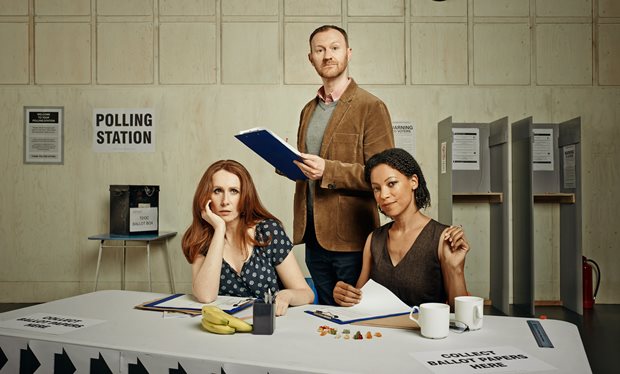He’s back on top form. James Graham has taken the unlikeliest setting, a polling station during the last hour of a general election, and turned it into a beautifully crafted comedy drama. The Vote at the Donmar was broadcast on Channel 4 last night at 8.30 p.m. We’re in a knife-edge London marginal constituency where a polling blunder has been uncovered.
A wizened pensioner voted twice by accident. Once in his brother’s name, once in his own. Panic stations. Democracy is threatened. Kirsty, an excitable teller, tries to even up the score by persuading a relative who hasn’t voted to cast his ballot under her discreet direction. This he does. But he votes for the wrong party. Now two extra votes are needed. Difficulties multiply. A drunkard takes his ballot paper to the pub to ponder his choice. That’s illegal. He’s hauled back by the cops who return his unused ballot paper. Problem solved. But the paper is sopping wet with spilt lager. Spoilt ballot. Kirsty is forced to break the law by blatantly impersonating an absentee neighbour and voting in her stead. Then the neighbour arrives and demands to vote.
These trivial-seeming difficulties are developed with great subtlety and craft. An independent candidate, obsessed with a local road scheme, prowls the action watching and listening. He gleans enough information to expose the well-meant criminality of Kirsty and her colleagues; will he denounce her or not? This uncertainty keeps us leaning in, fascinated. An extraordinary play. The conventions of a door-slamming farce blended with the intrigues of a political thriller and plonked into the folksy habitat of a school gym.
It also teaches us, very gently, about polling station rules. No photography. No phone calls. No canvassing. No rosettes or political insignia (except on candidates). No removing of ballot papers from the site. No soliciting advice from the returning officers or from random citizens. A clueless first-time elector seeks help from a computer-zombie on her phone. ‘Hello Siri. Who should I vote for?’
The characters are quirky, soap opera types with a generous dollop of Carry On crudeness. But we like them. We’re on their side because we share their belief in democracy. Even when Kirsty rigs the ballot she’s acting in the wider interests of political fairness. And she’s desperate to protect her bumbling, pedantic boss, played by Mark Gatiss, from any tincture of corruption.
Catherine Tate plays Kirsty with her usual sluttish quizzicality. Tim West gives a downbeat performance as a muddled pensioner. Judi Dench has a smallish role as a kindly granny who turns nasty when she learns that her daughter has snaffled her vote. And Jude Law swaggers on for barely 20 seconds as Kirsty’s stroppy brother-in-law who gets thrown out as soon as he arrives. Hats off to Law, by the way. He didn’t slope off straight away but stayed for the curtain call.
I assumed that this would be an amusing spoonful of political sucrose. Wrong. It’s complex, acute, very funny and oddly moving and profound as well. It deserves to be revived at the next general election. Perhaps at all of them.







Comments